Example Solved Problems with Answer, Solution, Formula - Integration: Revenue functions from Marginal revenue functions | 12th Business Maths and Statistics : Chapter 3 : Integral Calculus - II
Chapter: 12th Business Maths and Statistics : Chapter 3 : Integral Calculus - II
Integration: Revenue functions from Marginal revenue functions
Revenue functions from Marginal revenue
functions
If R is the total revenue function when the output is x,
then marginal revenue MR = dR/dx Integrating with respect to ŌĆś x ŌĆÖ we get
Revenue Function, R =
Ōł½ ( MR ) dx + k.
Where ŌĆśkŌĆÖ is the constant of integration which can be
evaluated under given conditions, when x = 0, the total revenue R
= 0,
Demand Function, P=R/x, x ŌēĀ 0
Example 3.16
For the marginal revenue function MR = 35 + 7x ŌłÆ 3x2 ,
find the revenue function and demand function.
Solution:
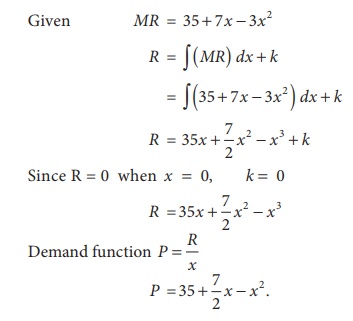
Example 3.17
A firm has the marginal revenue function given by MR =  where x is the output and a, b, c are constants. Show that the
demand function is given by x =
where x is the output and a, b, c are constants. Show that the
demand function is given by x = 
Solution:
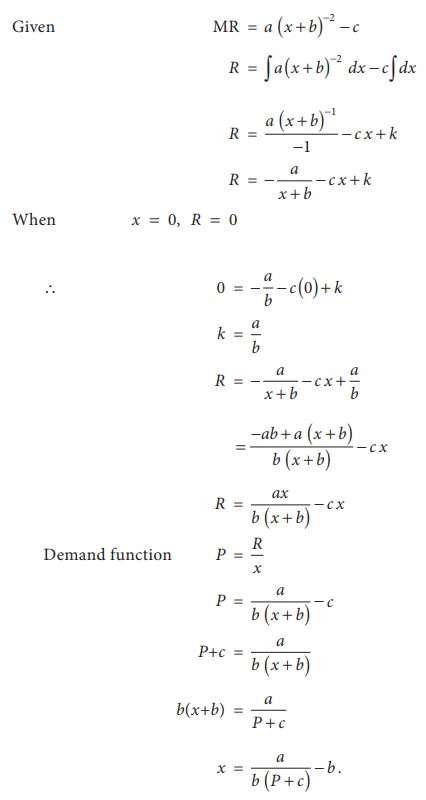
To find the Maximum Profit if Marginal Revenue and Marginal cost function are given:
If ŌĆśPŌĆÖ denotes the profit function, then  Integrating both sides with respect to x gives , P = Ōł½( MR ŌłÆ MC ) dx + k
Integrating both sides with respect to x gives , P = Ōł½( MR ŌłÆ MC ) dx + k
Where k is the constant of integration. However if we are
given additional information, such as fixed cost or loss at zero level of
output, we can determine the constant k. Once P is known, it can
be maximum by using the concept of maxima and minima.
Example 3.18
The marginal cost C ŌĆ▓ ( x) and marginal revenue R ŌĆ▓
( x) are given by C ŌĆ▓ ( x) = 50 + x/50 and RŌĆ▓ ( x)= 60 . The fixed
cost is Ōé╣200. Determine the
maximum profit.
Solution:
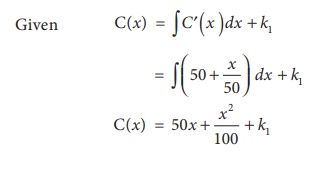
When quantity produced is zero, then the fixed cost is 200.
i.e. When x = 0, c = 200
k1 =200
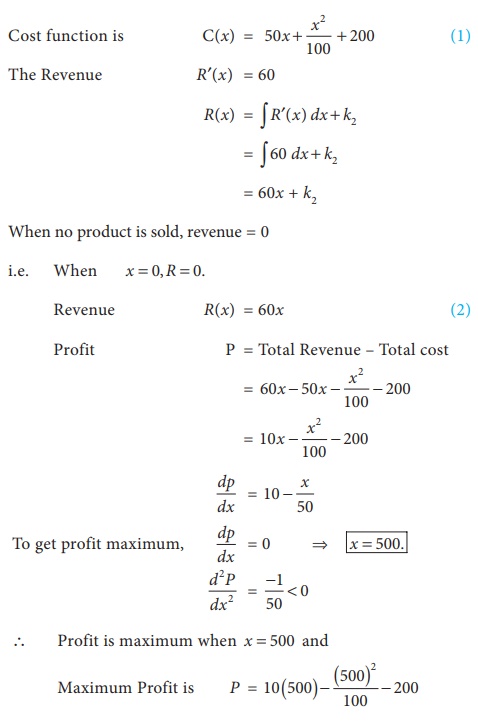
=5000 ŌĆō 2500 ŌĆō 200
=2300
Profit = Ōé╣
2,300.
Example 3.19
The marginal cost and marginal revenue with respect to commodity
of a firm are given by C ŌĆ▓
( x) = 8 + 6x and R ŌĆ▓ ( x)= 24. Find the total
Profit given that the total cost at zero output is zero.
Solution:
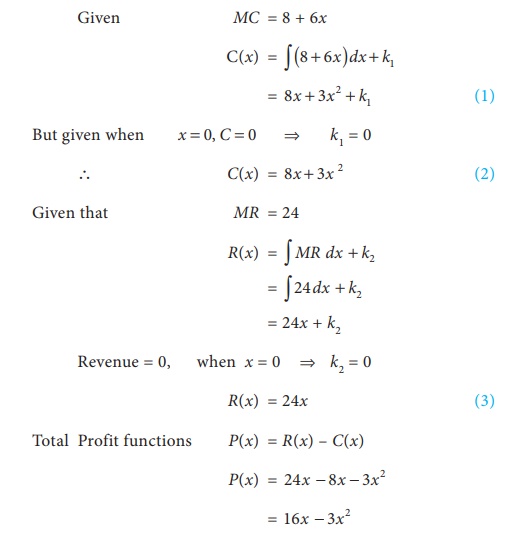
Example 3.20
The marginal revenue function (in thousand of rupees ) of a
commodity is 10 +
eŌłÆ0. 05x Where x is the
number of units sold. Find the total revenue from the sale of 100 units (eŌłÆ5 = 0.0067)
Solution:
Given, Marginal revenue R ŌĆ▓ ( x) = 10 + eŌłÆ0 .05x
Total revenue from sale of 100 units is

Total revenue = 1019.87 ├Ś 1000
= Ōé╣10,19,870
Example 3.21
The price of a machine is Ōé╣5,00,000
with an estimated life of 12 years. The estimated salvage value is Ōé╣30,000. The
machine can be rented at Ōé╣72,000 per year. The present value of the rental
payment is calculated at 9% interest rate. Find out whether it is advisable to
rent the machine. (eŌłÆ1 .08 = 0.3396) .
Solution:
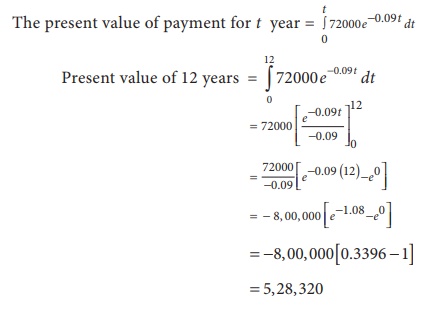
Cost of the machine =
5, 00, 000 ŌłÆ 30, 000
=4, 70, 000
Hence it not advisable to rent the machine
It is better to buy the machine.
Inventory :
Given the inventory on hand I ( x ) and the unit
holding cost (C1), the total inventory carrying
cost is C1 0Ōł½T0 I (x )dx, where T
is the time period under consideration.
Example 3.22
A company receives a shipment of 200 cars every 30 days. From
experience it is known that the inventory on hand is related to the number of
days. Since the last shipment, I ( x)= 200 ŌłÆ 0.2x . Find the daily holding cost for maintaining
inventory for 30 days if the daily holding cost is Ōé╣3.5
Solution:
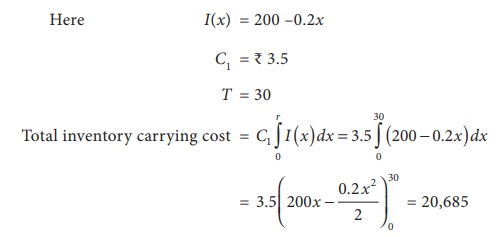
Amount of an Annuity
The amount of an annuity is the sum of all payments made plus all
interest accumulated. Let an annuity consist of equal payments of Rs. p and let
the interest rate of r percent annually be compounded continuously.
Amount of annuity after N payments A = 
Example 3.23
Mr. Arul invests Ōé╣10,000 in ABC Bank each year, which pays an
interest of 10% per annum compounded continuously for 5 years. How much amount
will there be after 5 years. (
e0 .5 =
1.6487)
Solution:
p = 10000, r = 0.1, N = 5
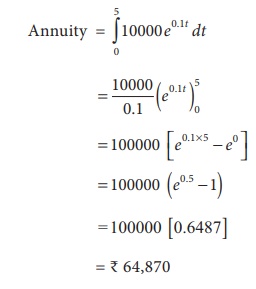
Consumption of a Natural Resource
Suppose that p(t) is the annual consumption of a natural resource
in year t. If the consumption of the resource is growing exponentially at
growth rate k, then the total consumption of the resource after T years is
given by
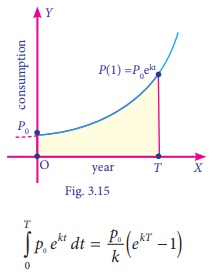
Where p0 is the initial annual consumption at
time t = 0.
Example 3.24
In year 2000 world gold production was 2547 metric tons and it was
growing exponentially at the rate of 0.6% per year. If the growth continues at
this rate, how many tons of gold will be produced from 2000 to 2013? [e0.078
= 1.0811)
Solution:
Annual
consumption at time t = 0 (In the year 2000) = p0 = 2547 metric
ton.
Total production of Gold from 2000 to 2013 =
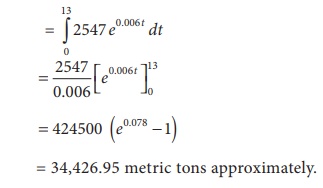
Related Topics